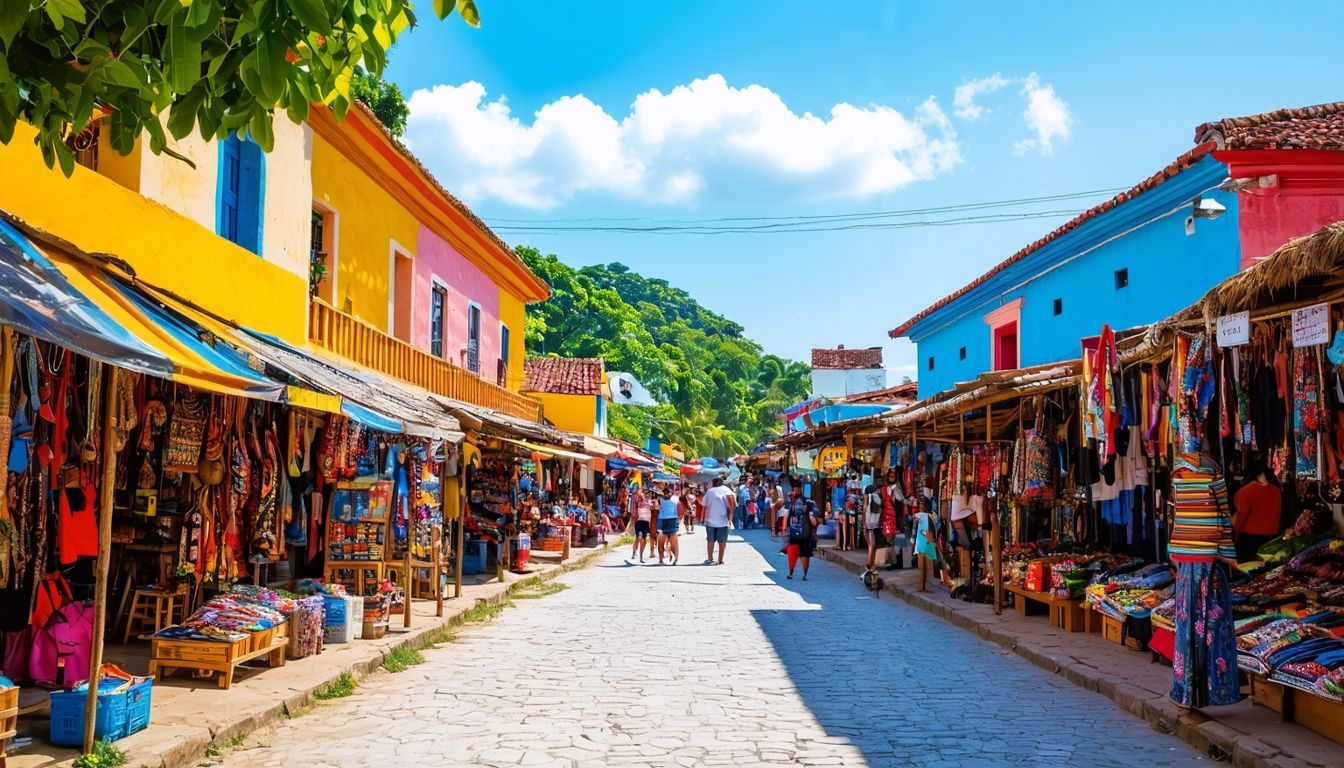A Comprehensive Guide to Selling Property in the Dominican Republic

Key Takeaways:
| Topic | Takeaway |
|---|---|
| Dominican Real Estate Market | Diverse market with opportunities in beachfront and urban properties. Research regional trends and values. |
| Legal Requirements | Clear property title, capital gains tax, and legal representation are crucial considerations. |
| Property Preparation | Repairs, renovations, staging, and professional photography enhance property appeal and value. |
| Marketing Strategies | Utilize online listings, real estate agents, and social media for broad exposure. |
| Sale Process | Navigate listing, offers, due diligence, and closing with clear understanding of each stage. |
| Post-Sale Considerations | Consult tax advisors and familiarize yourself with fund repatriation regulations. |
Introduction
Selling property in the Dominican Republic as an expatriate can be both thrilling and challenging. The country's dynamic real estate market, coupled with its stunning natural beauty and rich cultural heritage, presents unique opportunities for those looking to sell their property. However, navigating the complexities of a foreign real estate market requires careful planning and a thorough understanding of local regulations, market trends, and effective selling strategies.
This comprehensive guide aims to equip expatriates with the necessary knowledge and tools to successfully sell their property in the Dominican Republic. By providing valuable insights into the local real estate market, legal requirements, property preparation, marketing strategies, and the sale process itself, this guide will help ensure a smooth, profitable, and stress-free transaction.
Understanding the Dominican Real Estate Market
The Dominican Republic boasts a diverse and thriving real estate market, catering to a wide range of preferences and budgets. From luxurious beachfront villas to modern urban apartments, the country offers a variety of properties that appeal to both local and international buyers.
To successfully sell your property, it is essential to have a deep understanding of the local real estate market. This involves:
- Researching current market trends, property values, and buyer preferences specific to your region
- Staying informed about the latest developments in the Dominican real estate sector
- Considering the unique factors that drive demand in the Dominican Republic's real estate market, such as the growing tourism industry, attractive investment opportunities, and favorable tax incentives for foreign buyers
By understanding these market drivers, you can position your property effectively and attract potential buyers.
Legal Requirements for Selling Property
Selling property in the Dominican Republic involves several legal requirements that expatriates must be aware of to ensure a smooth and compliant transaction. These requirements are designed to protect the interests of both the seller and the buyer while adhering to local laws and regulations.
Title Transfer
One of the most critical aspects of selling property in the Dominican Republic is ensuring that your property title is clear and transferable. This means that you must have a valid and up-to-date title deed, free from any outstanding liens, encumbrances, or disputes. It is recommended to:
- Conduct a thorough title search
- Obtain a certificate of title from the local land registry office to verify the legal status of your property
Capital Gains Tax
As an expatriate selling property in the Dominican Republic, it is essential to familiarize yourself with the capital gains tax obligations. Capital gains tax is levied on the profit earned from the sale of a property, calculated as the difference between the purchase price and the sale price. The tax rate and exemptions may vary depending on factors such as the length of ownership and the seller's residency status. Consult with a local tax expert to understand your specific tax liabilities and ensure compliance with Dominican tax laws.
Legal Representation
Navigating the legal aspects of selling property in a foreign country can be complex and overwhelming. To protect your interests and ensure a smooth transaction, it is highly advisable to hire a local attorney who specializes in real estate transactions. A knowledgeable attorney can:
- Guide you through the legal process
- Review contracts
- Handle the necessary paperwork on your behalf
- Provide valuable advice on compliance with local regulations
- Help resolve any legal issues that may arise during the sale process
Preparing Your Property for Sale
To attract potential buyers and maximize your property's value, it is essential to invest time and effort into preparing your property for sale. A well-maintained and visually appealing property not only generates more interest from buyers but also helps justify a higher selling price.
Repairs and Renovations
Before listing your property, conduct a thorough assessment to identify any necessary repairs or renovations. Consider:
- Addressing structural issues, plumbing or electrical problems, and cosmetic flaws that may deter potential buyers
- Making strategic updates to modernize your property and enhance its overall appeal, such as fresh paint, updated flooring, or renovating key areas like the kitchen or bathrooms
Staging
Staging your property is a powerful way to showcase its potential and help buyers envision themselves living in the space. Professional staging involves strategically arranging furniture, decor, and accessories to highlight your property's best features and create an inviting atmosphere. A well-staged property can evoke positive emotions in buyers, making them more likely to develop a strong connection with the space and ultimately submit an offer.
Professional Photography
In today's digital age, high-quality photographs are essential for effectively marketing your property online. Invest in professional photography services to capture your property's best features and create a lasting first impression on potential buyers. A skilled photographer will know how to use lighting, angles, and composition to showcase your property in the most attractive and compelling way possible. These high-quality images will be invaluable when listing your property on real estate websites and social media platforms.
Marketing Your Property
Effective marketing is key to reaching a wide pool of potential buyers and generating interest in your property. In the Dominican Republic, there are multiple channels available to promote your property and attract qualified buyers.
| Marketing Channel | Description |
|---|---|
| Online Listings | List your property on reputable websites that cater to both local and international buyers. These platforms provide exposure to a large audience and allow you to showcase your property's best features through detailed descriptions, high-quality photographs, and virtual tours. |
| Real Estate Agents | Partner with a local real estate agent who has experience working with expatriates. They have access to a network of potential buyers and can leverage their industry knowledge and marketing resources to promote your property effectively. |
| Social Media | Utilize platforms such as Facebook, Instagram, and Twitter to showcase your property's best features, share virtual tours, and engage with potential buyers. Join relevant real estate groups and expat communities on social media to tap into a targeted audience. |
Navigating the Sale Process
The sale process in the Dominican Republic involves several key stages, from listing your property to closing the deal. Understanding and preparing for each stage will help ensure a smooth and successful transaction.
Listing the Property
Once your property is prepared for sale and you have determined a competitive asking price, it's time to list your property on the market. Work with your real estate agent in Dominican Republic to create a compelling listing that showcases your property's unique features and benefits. Ensure that all necessary information, such as property specifications, amenities, and location details, is accurately represented in the listing.
Receiving Offers
As potential buyers express interest in your property, you will start receiving offers. Review each offer carefully, considering factors such as the proposed price, contingencies, and closing timeline. Your real estate agent can assist you in evaluating offers and provide guidance on negotiation strategies. Be prepared to counteroffer or reject offers that do not meet your expectations, while remaining open to reasonable compromises.
Due Diligence
Once you have accepted an offer, the buyer will typically conduct due diligence to ensure the property's legal standing and physical condition. This may involve:
- Title searches
- Property inspections
- Reviewing relevant documents such as property deeds and permits
As the seller, it is your responsibility to provide the necessary documentation and facilitate access to the property for inspections. Address any issues or concerns raised during the due diligence process promptly to avoid delays or complications.
Closing the Sale
The final stage of the sale process involves closing the deal and transferring ownership of the property to the buyer. In the Dominican Republic, closing typically takes place through a notary public, who will prepare and legalize the necessary documents, including the title transfer deed. Both parties will sign the closing documents, and the buyer will provide the agreed-upon payment. Once the funds have been received and the title has been transferred, the sale is considered complete.
Post-Sale Considerations
After successfully closing the sale of your property in the Dominican Republic, there are a few important post-sale considerations to keep in mind.
Tax Implications
Consult with a qualified tax advisor to understand any tax liabilities resulting from the sale of your property. This may include capital gains tax, which is levied on the profit earned from the sale. Your tax advisor can help you calculate your tax obligations and ensure compliance with Dominican tax laws. They can also advise you on any available deductions or exemptions that may help minimize your tax burden.
Repatriating Funds
If you plan to repatriate the proceeds from the sale of your property, familiarize yourself with the process and regulations for transferring funds out of the Dominican Republic. Work with your bank or a reputable financial institution to understand the necessary documentation and procedures for repatriating your funds. Be aware of any potential fees, currency exchange rates, and tax implications associated with the transfer of funds across borders.
Frequently Asked Questions (FAQ)
-
Q: How long does it typically take to sell a property in the Dominican Republic?
The time it takes to sell a property in the Dominican Republic varies depending on factors such as location, property type, market conditions, and pricing. On average, it can take anywhere from a few months to a year to find a suitable buyer and complete the sale process. -
Q: Are there any restrictions on foreign ownership of property in the Dominican Republic?
No, there are no restrictions on foreign ownership of property in the Dominican Republic. Expatriates can purchase and sell property in the country with the same rights as Dominican citizens. -
Q: What are the costs associated with selling a property in the Dominican Republic?
The costs associated with selling a property in the Dominican Republic may include real estate agent commissions, legal fees, notary fees, capital gains tax, and any outstanding property taxes or utility bills. It's essential to factor in these costs when determining your selling price and net proceeds. -
Q: Can I sell my property in the Dominican Republic remotely? A: Yes, it is possible to sell your property in the Dominican Republic remotely. However, it is recommended to work with a trusted real estate agent and attorney who can handle the process on your behalf. You may need to grant power of attorney to your representative to sign documents and complete the sale in your absence.
-
Q: What is the role of a notary public in the property sale process?
In the Dominican Republic, a notary public plays a crucial role in the property sale process. They are responsible for preparing and legalizing the necessary documents, including the title transfer deed. The notary ensures that the sale is conducted in accordance with Dominican law and that the transfer of ownership is properly recorded. -
Q: How can I determine the right selling price for my property?
To determine the right selling price for your property, research recent sales of similar properties in your area, consult with local real estate agents, and consider factors such as location, property condition, and market demand. A professional appraisal can also provide an objective assessment of your property's value. -
Q: What are some effective ways to market my property to international buyers?
To reach international buyers, list your property on reputable real estate websites that cater to a global audience. Utilize social media platforms to showcase your property and engage with potential buyers. Partner with a real estate agent who has experience working with international clients and can leverage their network to promote your property effectively. -
Q: Are there any tax incentives for buyers of property in the Dominican Republic?
Yes, the Dominican Republic offers several tax incentives for property buyers, such as exemptions on property transfer taxes and reduced property tax rates for certain types of properties. These incentives can be attractive to potential buyers and may help expedite the sale process. -
Q: What are the most popular areas for expatriates to buy property in the Dominican Republic?
Popular areas for expatriates to buy property in the Dominican Republic include coastal regions such as Punta Cana, Puerto Plata, and Samaná, as well as the capital city of Santo Domingo. These areas offer a mix of beachfront properties, resort-style living, and urban amenities that appeal to foreign buyers. -
Q: Can I sell my property in the Dominican Republic if I have an outstanding mortgage?
Yes, you can sell your property in the Dominican Republic even if you have an outstanding mortgage. However, you will need to use the proceeds from the sale to pay off the remaining mortgage balance before transferring the title to the buyer. It's essential to communicate with your lender and provide them with the necessary documentation to facilitate the mortgage payoff during the sale process.
Conclusion
Selling property in the Dominican Republic as an expatriate can be a rewarding and profitable endeavor, but it requires careful planning, understanding of local market dynamics, and adherence to legal requirements. By following the comprehensive guide outlined in this article, expatriates can navigate the selling process with confidence and maximize their chances of a successful transaction.
To recap, key steps in selling property in the Dominican Republic include:
- Understanding the local real estate market
- Ensuring compliance with legal requirements
- Preparing your property for sale
- Implementing effective marketing strategies
- Navigating the sale process from listing to closing
- Considering post-sale matters such as tax implications and repatriating funds
By staying informed, working with experienced professionals, and maintaining a proactive approach throughout the selling process, expatriates can unlock the full potential of their property investments in the Dominican Republic and achieve their desired outcomes.
Categories
- All Blogs (61)
- agent (1)
- branded residence (1)
- business (2)
- buy (2)
- buying (23)
- cabarete (1)
- cap cana (6)
- caribbean (2)
- casa de campo (6)
- celebrity (2)
- commercial (1)
- construction (2)
- dominican republic (9)
- evaluation (1)
- event (1)
- financing (1)
- golf (2)
- golf resorts (2)
- Grupo De Vale (1)
- hotel (1)
- insurance (1)
- investing (26)
- las terrenas (1)
- law (3)
- lawyer (1)
- legal (1)
- luxury (1)
- market (1)
- north coast (2)
- properties (7)
- property inspection (1)
- property tax (1)
- puerto plata (1)
- punta cana (3)
- real esate (1)
- real estate (33)
- renting (5)
- resorts (1)
- selling (5)
- selling, (1)
- tax (3)
- usa (1)
- vacation rental (2)
Recent Posts










GET MORE INFORMATION NOW

